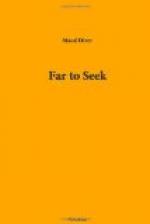To that profound question came no answer in words; only in hidden stirrings, that she preferred to ignore. Both brother and sister had persuaded themselves that talk of a gulf was exaggerated by unfriendly spirits. They, at all events, having built their bridge, took its stability for granted. Children of an emotional race, it sufficed to discover that they loved the cool green freshness of England, the careless kindly freedom of her life and ways; the hum of her restless, smoky, all-embracing London; her miles and miles of books and pictures. Above everything they loved Oxford, where all were brothers in spirit—with a proper sense of difference between the brothers of one’s own college and the mere outsider:—Oxford, at this particular hour of this particular June evening. And at this actual moment, they loved salmon mayonnaise and crushed strawberries fully as much as any other manifestation of the delectable land.
And down in subconscious depths—untroubled by the play of surface emotions—burned their passionate, unreasoned love of India that any chance breath might rekindle to a flame.
Presently, as the sun drew down to earth, trees and meadows swam in a golden haze. Arrows of gold, stealing through alders and willows, conjured mere leaves into discs of pure green light. Clouds of pollen brightened to dust of gold. In the near haze midges flickered; and, black against the brightness, swallows wheeled and dipped, uttering thin cries in the ecstasy of their evening flight.
On the two punts in the backwater a great peace descended after the hilarity of their feast. Clouds of cigarette smoke kept midges at bay. In the deepening stillness small sounds asserted themselves—piping of gnats, the trill of happy birds, snatches of disembodied laughter and talk from other parties in other punts, somewhere out of sight....
Only Aruna did not smoke; and Emily Barnard, her fanatic devotee, retired with her to the bank, where they made a lazy pretence of “washing up.” But Aruna’s eyes would stray toward the recumbent figure of Roy, when she fancied Emmie was not looking. And Emmie—who could see very well without looking—wished him at the bottom of the river.
Propped on an elbow, he lay among Aruna’s cushions, his senses stirred by the faint carnation scent she used, enlarging on his latest enthusiasm—Rabindranath Tagore, the first of India’s poet-saints to challenge the ethics of the withdrawn life. When the mood was on, the veil of reserve swept aside, he could pour out his ardours, his protests, his theories, in an eloquent rush of words. And Aruna—absently wiping spoons and forks—listened entranced. He seemed to be addressing no one in particular; but as often as not his gaze rested on Broome, as though he were indirectly conveying to him thoughts he felt shy of airing when they were alone.
A pause in the flow of his talk left a space of silence into which the encompassing peace and radiance stole like an inflowing tide. None loved better than Roy the ghostly music of silence; but to-night his brain was filled with the music of words—not his own.




